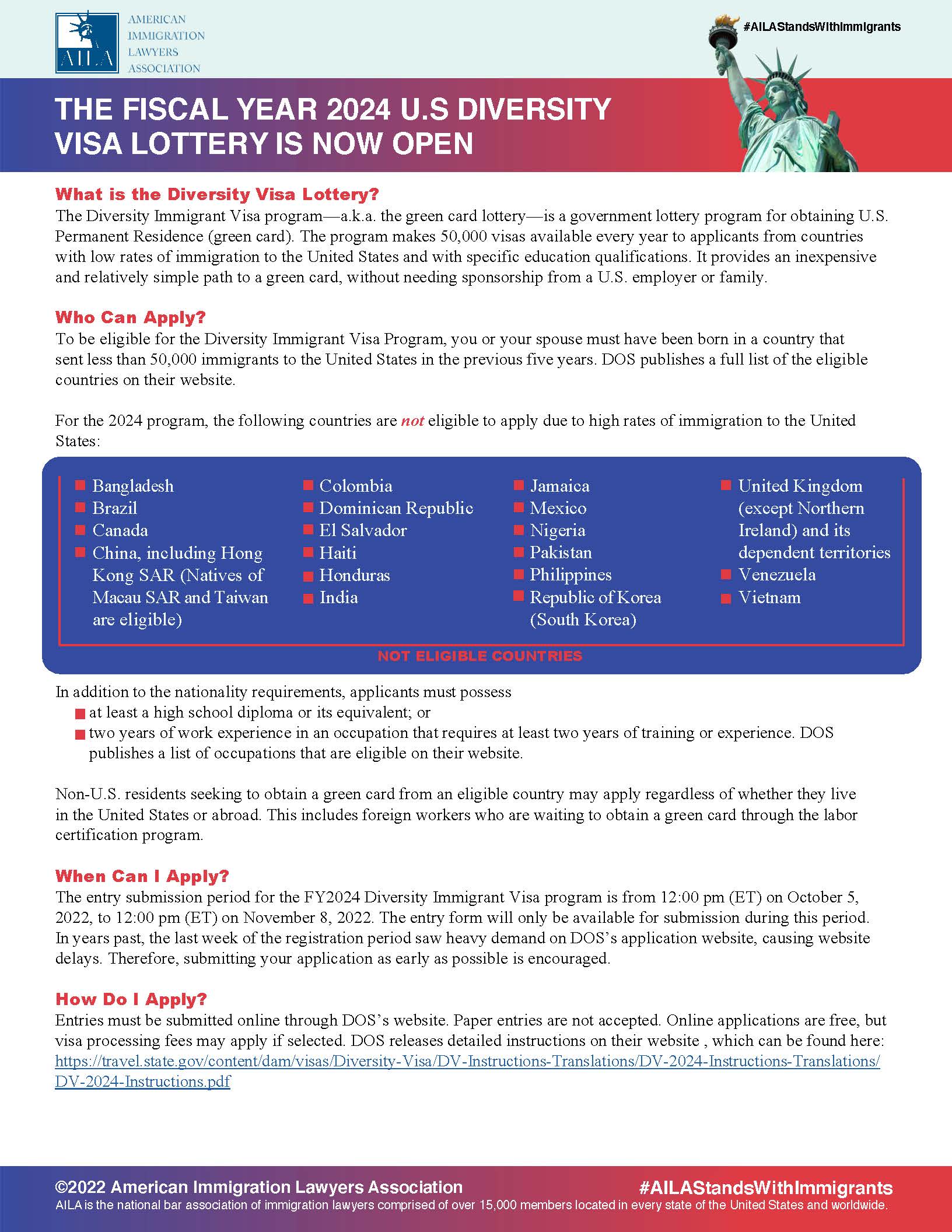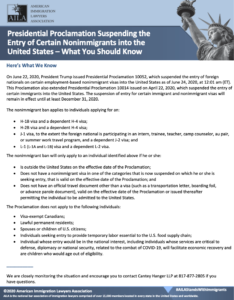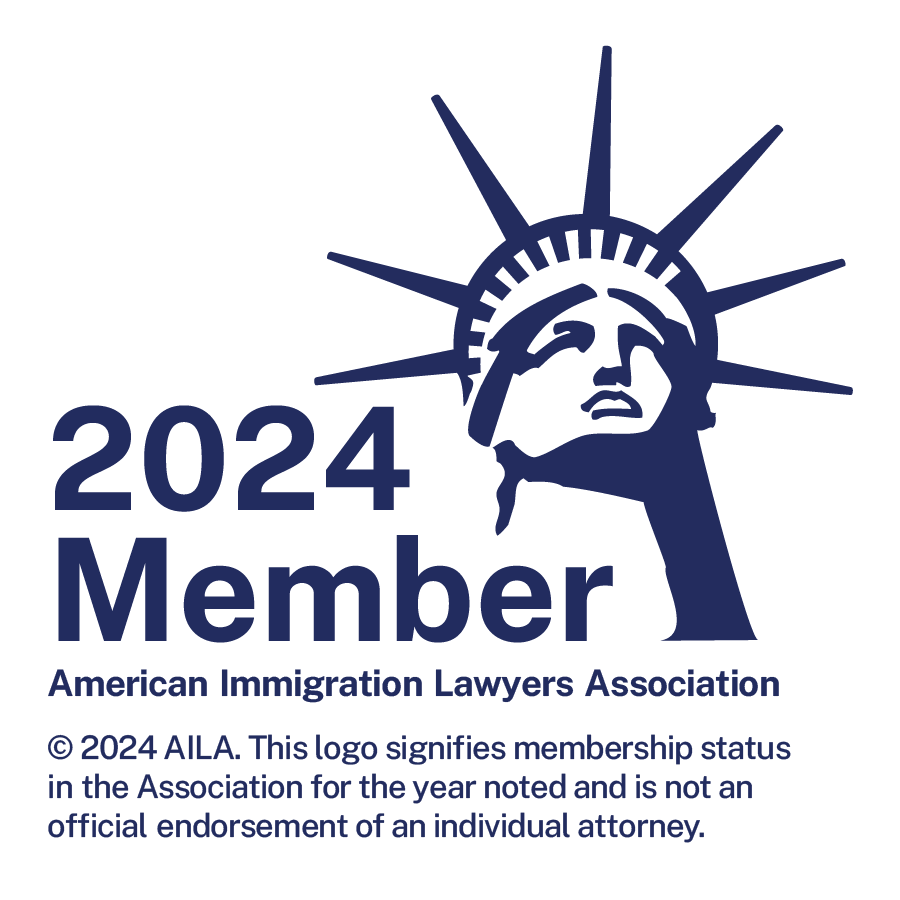Good news on H-4, L-2, and EAD processing!
Beginning January 25, 2023, USCIS will resume bundling the adjudication of Forms I-539 and I-765 for the spouses and minor children of H-1B and L-1 nonimmigrants along with the underlying Form I-129 if the forms are filed concurrently. USCIS will adjudicate these applications together whether the I-129 petition is filed under regular or premium processing. This bundled process will be in effect for two years. The announcement did not clarify whether this applies to pending cases or merely cases filed 1/25/2023 or later.
The Fiscal Year 2024 U.S. Diversity Visa Lottery is Now Open!

THE NONIMMIGRANT VISA INTERVIEW WAIVER PROCESS

Presidential Proclamation Suspending the Entry of Certain Nonimmigrants into the United States – What You Should Know
President Trump’s Proclamation effective June 24, 2020
The Proclamation suspending entry of nonimmigrants to the U.S. is effective June 24, 2020 at 12:01 AM ET and extends through December 31, 2020, subject to revisions and extension.
This Proclamation extends the earlier April 22, 2020 Proclamation suspending entry of certain immigrants into the U.S. through the end of the year as well.
The Proclamation affects the following nonimmigrant categories plus spouse & children: H-1B, H-2B, J and L.
It only applies to those individuals if they are:
· Outside of the U.S. on the effective date of the Proclamation;
· Do not have a nonimmigrant visa that is valid on the effective date of the Proclamation; and
· Do not have an official travel document other than a visa such as advance parole which is valid on the effective date of the Proclamation.
It is not clear if Canadian citizens who are not required to have a visa will be exempt from this Proclamation.
There are limited exemptions such as those seeking to enter the U.S. to provide temporary labor essential to the U.S. food supply chain, or those who are need to provide services in the national interest of the U.S. such as defense, medical care to COVID-19 patients, or essential to facilitate the immediate and continued economic recovery of the U.S.
This Proclamation does not affect those nonimmigrants already in the U.S.
__________
This office advises against international travel in the event further restrictions are placed on nonimmigrants.
Types of Temporary Work Visas
Temporary work visas are a popular way for people to come to the U.S. for seasonal or periodic employment, and there are several types available. If you’re interested in coming to the U.S. for work or business purposes, here’s what you need to know.
Types of Temporary Work Visas: Business and Working Categories
There are several types of temporary work visas that may apply in your situation. You must have a prospective employer file a petition with U.S. Citizenship and Immigration Services on your behalf, and the petition must be approved, before you can apply for a work visa. However, there are two main exceptions: the B-1 visa and through the WB Temporary Business Visitors program.
Related: Investor visas to come to the U.S.
Temporary Work Visas
Each type of visa listed in the table below requires employer sponsorship. That means an employer must sponsor you to fill a specific position before you can apply for the work visa you’ll need to come to the United States.
| Visa Category | Purpose of the Visa |
H-1B Visa |
These temporary work visas are reserved for people working in specialty occupations. Generally, these occupations require a college degree or its equivalent. However, these visas are also available to fashion models of distinguished merit and ability, people involved in government-to-government research and development, and those involved in co-production projects administered by the U.S. Department of Defense. |
H-2A Visa |
These visas are for temporary or seasonal agricultural work. They’re limited to people from designated countries unless the U.S. government decides it’s in the U.S.’s best interest. |
H-2B Visa |
These types of temporary work visas are for temporary or seasonal non-agricultural work. Like H-2A visas, they’re limited to people from designated countries with very few exceptions. |
H-3 Visa |
These visas are for people who need to receive training (other than graduate medical or academic) that isn’t available in their home countries, or practical training programs in education for children with mental, physical or emotional disabilities. |
L Visa |
These visas are available to people who are going to work at a branch, parent, affiliate or subsidiary of their current employer in a managerial or executive capacity, or in a job position that requires specialized knowledge. |
O Visa |
These temporary visas are reserved for people of extraordinary ability or achievement in science, art, education, business, athletics or recognized achievements in movies and television. People providing essential services in support of the person applying for the O visa also qualify. |
P-2 Visa |
These visas are available to people who are coming to the U.S. for performance under a reciprocal exchange program, as well as the people who provide them with essential services. |
P-3 Visa |
These temporary work visas are for people who are coming to the U.S. to perform, teach or coach under a program that’s considered “culturally unique” or a traditional ethnic, cultural, folk, musical, theatrical or artistic performance or presentation, as well as those who provide the visa holder with essential services. |
Q Visa |
These visas are for people who come to the U.S. for practical training and employment, as well as for sharing history, culture and traditions of their home country through participation in an international cultural exchange program. |
Related: Permanent worker visas in the U.S.
B-1 Visas 
B-1 visas are available to people who will be participating in business activities in the U.S., such as consulting with business associates, attending conventions or conferences, settling estates or participating in short-term training.
WB Temporary Business Visitors
WB temporary business visitors can come to the U.S. under the Visa Waiver Program if they’re from one of 35 participating countries. (A list of those countries is located here.)
Do You Need to Discuss Temporary Work Visas With an Attorney?
Whether you’re an employer looking for foreign workers or you’re a worker who needs to apply for a temporary work visa, we may be able to help you. Contact us today to schedule your consultation.







